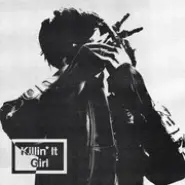
This song evolved from a cover of Polly by Nirvana, and that was the title initially.
This song evolved from a cover of Polly by Nirvana, and that was the title initially.
I see it as Polly from Polly's perspective. A girl expressing her agency in the only ways she can in a horrific situation of kidnap and rape.
I see it as Polly from Polly's perspective. A girl expressing her agency in the only ways she can in a horrific situation of kidnap and rape.
"Your brown eyes are my blue skies. They light up the rivers that the birds fly over. Better not to quench your thirst. Better not to be the first one diving in, though you caught me and you know why you breathe in the deepest part of the water."
"Your brown eyes are my blue skies. They light up the rivers that the birds fly over. Better not to quench your thirst. Better not to be the first one diving in, though you caught me and you know why you breathe in the deepest part of the water."
His eyes are the sky and...
His eyes are the sky and she is the river underneath him, she is warning him it's better not to 'be the first one diving in' even though he has caught her for this purpose. The sky is a powerful image but the undertow of a river, while invisible, is also powerful. The river also shows the sky a reflection of itself.
"What's the matter? You hurt yourself? Open your eyes and there was someone else Now i've got you in the undertow. Now i've got you in the undertow. Why you wanna blame me for your troubles? Ah ah ah you better learn your lesson yourself. Nobody ever has to find out what's in my mind tonight."
He opens his eyes to see he has become someone else, his actions have hurt him as well as her, they have turned him into a monster. He has got her, but she has 'got' him, he will also never be the same again. The blame line alludes to how abusers find ways to blame their victims for their actions. I'm the original song, the perpetrator is trying to guess what Polly wants and what she thinks. But the power and agency Polly holds onto is that he will never know what is in her mind.
"Let tonight pass us by. Do you really want to be the one to fight? And i said "You're better not to light that fire. It will take you to the darkest part of the weather.""
In the true story Polly was based on, the attacker uses a blow torch. The weather (in the sky that's his eyes) is made darker because of his actions, and again she reflects that back to him.
"Nobody ever has to find out what's in my mind tonight. Nobody in my mind. Nobody in my mind. I feel it in my heart tonight. I lay on the floor, pressing in my eyes. Seeing little lights. Please light these decisions that only one could make I wanted to stay home but i went running running running running from the troubles running running running running from the troubles"
Again, she's resisting letting him into her mind to retain a form of control. She presses in her eyes so she doesn't have to see the darkest part of the weather in him, and to break any connection between them.
The running part could represent when Polly managed to flee from his truck.
The song could also be using Polly as a metaphor for the writer's relationship, that she felt snared and trapped in but managed to escape from.

♫♪ Oohhhhh.. I wish there were another verse...♫♪
♫♪ Oohhhhh.. I wish there were another verse...♫♪
Or bridge... SOMETHING.
Or bridge... SOMETHING.
Roger, this song was too good not to finish! It's WAY too short.!
Roger, this song was too good not to finish! It's WAY too short.!

This is not 'Aubade' - this is 'Home Again'.
This is not 'Aubade' - this is 'Home Again'.

Rob Thomas songs kind of sound like the guy was traumatized in his youth. Seems like this tune is about a nutty parent who, while maybe they love you, is not really in the correct headspace to be a parent. I can relate.
Rob Thomas songs kind of sound like the guy was traumatized in his youth. Seems like this tune is about a nutty parent who, while maybe they love you, is not really in the correct headspace to be a parent. I can relate.

definitely reminds me of the movie he was in - firecracker - with the line ‘you sewed me up but it will never heal’… but this song came out before that movie, so most likely not connected
definitely reminds me of the movie he was in - firecracker - with the line ‘you sewed me up but it will never heal’… but this song came out before that movie, so most likely not connected

i think i figured out what he said at he said at the start "can the kemper of the dahy, to the streets to the streets, the ferrying of tears the proclamation of to the streets, to the streets, can the kempers of the dahy, to the streets, to the streets" it could be that its "denial" and not "dahy"
i think i figured out what he said at he said at the start "can the kemper of the dahy, to the streets to the streets, the ferrying of tears the proclamation of to the streets, to the streets, can the kempers of the dahy, to the streets, to the streets" it could be that its "denial" and not "dahy"

This song is a protest against intervention by people in a position of authority, whether that is the government (Taxes, invasive laws, ETC), school, parents, ETC. The narrator is simply saying that what is being done to them is not acceptable.
This song is a protest against intervention by people in a position of authority, whether that is the government (Taxes, invasive laws, ETC), school, parents, ETC. The narrator is simply saying that what is being done to them is not acceptable.

Not sure why the lyrics for "Whichever Way The Wind Blows" are here too.
Not sure why the lyrics for "Whichever Way The Wind Blows" are here too.

No explanation what SSC means?
No explanation what SSC means?











It's funny, my impression of this song did a complete 180. Been listening to the new album and getting to know it better, and at first I really didn't like this song. The sound is cool, a lot of swagger. But I wasn't a fan of the "love song" aspect. Some key lines in the song just rubbed me the wrong way - take my money, wanting the girl to quit her job, love me for the rest of MY life.
It's funny, my impression of this song did a complete 180. Been listening to the new album and getting to know it better, and at first I really didn't like this song. The sound is cool, a lot of swagger. But I wasn't a fan of the "love song" aspect. Some key lines in the song just rubbed me the wrong way - take my money, wanting the girl to quit her job, love me for the rest of MY life.
Then I remembered that Badflower often tells stories by speaking in the first person of the character they're...
Then I remembered that Badflower often tells stories by speaking in the first person of the character they're criticizing. Satire.
Now, the great thing about song interpretation is that lyrics can mean a lot of different things to different people. I don't think this is necessarily what the band intended, but it's what I thought of:
In abusive relationships, there's a lot of love bombing and romanticizing and fantasizing in the beginning. Abusers want their partners dependent on them and to isolate them from their friends/ families/ support systems. So asking a girl to quit her job, saying they'll pay her way, and wanting her to move away with them - can be red flags.
Then you've got the narcissism of wanting her to love him for the rest of HIS life.
Again, probably not the intention for the song. But it's what stuck out to me, and why I got the ick the first few times I listened to this song.
I think actually the character in this song is probably more on the pathetic side than being abusive. More desperate. Doesn't care if the girl doesn't love him - just wants to quell his loneliness. And if he's got money, then he's got something that might attract someone, it's one thing of value he can offer. Maybe this is a couple where both parties use each other, they both get something out of it (him company, her money) - even if it's not love.
Whatever is taken from this song, I have an easier time listening if I don't take it at face value, don't take it as a love song. And I do think the red flags in terms of abuse can be useful info, even if it's not necessarily what the song's about.
And you can probably take another different meaning from the video! Like a hopeless romantic.